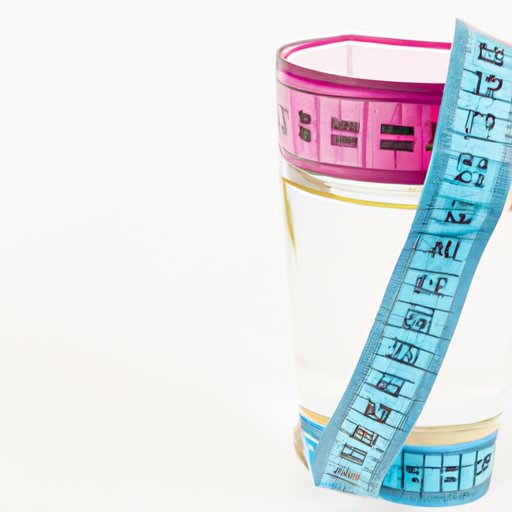
Will Drinking Water Help Me Lose Weight?
Drinking water is essential to our health, but can it help us lose weight? In this article, we will explore the relationship between water intake and weight loss, the science behind drinking water and weight loss, practical tips for incorporating water into a weight loss routine, success stories of individuals who have incorporated a focus on water intake into their weight loss journey and insights and advice on staying motivated to drink enough water for weight loss.
Overview of the Relationship between Water and Weight Loss
Water is a vital component of our bodies, making up roughly 60% of our overall weight. Our bodies use water for a variety of functions, including maintaining body temperature, removing waste, and transporting nutrients.
Drinking water can also impact our metabolism, which is the chemical process that converts food into energy. Studies have shown that drinking water can increase the number of calories burned, which can help with weight loss.
Another benefit of drinking water for weight loss is that it can help reduce appetite and increase feelings of fullness or satiety. This can lead to consuming fewer calories overall, which is an important factor in weight loss.
Exploring the Science behind Drinking Water and Weight Loss
Research has shown that drinking water before meals can help reduce overall calorie intake. A study published in the Journal of the American Dietetic Association found that people who drank water before meals consumed an average of 75 fewer calories per meal, which adds up to 27,000 fewer calories per year.
Another factor to consider is “water weight,” which is the weight gained or lost due to changes in water retention in the body. Drinking more water can actually help to reduce water weight by flushing excess sodium out of our system, which in turn can lead to a reduction in overall weight.
Additionally, proper hydration is essential for fat burning and muscle building. A dehydrated body is not capable of burning fat or building muscle as efficiently as a hydrated one.
Outlining Practical Tips for Incorporating Water into a Weight Loss Routine
So, how much water should you drink daily for weight loss? The general rule of thumb is to drink at least 8 cups (64 ounces) of water per day. However, it’s important to note that the amount of water you need may vary depending on your age, gender, weight, activity level, and climate.
Drinking water throughout the day can help you stay hydrated and ensure that you are meeting your daily intake goals. Try to drink water with every meal and snack, and carry a water bottle with you wherever you go.
If you find plain water boring, try adding fruit slices, such as lemon or cucumber, to your water to add flavor and nutrients. Additionally, herbal teas and infused water can be a delicious way to increase your water intake.
There are also certain drinks to avoid when trying to lose weight, such as soda and juice. These beverages are often high in sugar and calories, which can sabotage weight loss efforts.
Success Stories of Individuals Who Have Incorporated a Focus on Water Intake into Their Weight Loss Journey
Many people have found success with incorporating water into their weight loss journey. For example, Catherine lost 50 pounds by making water her drink of choice and seeing it as a vital part of her lifestyle. She says, “I drink water all day, every day. It’s critical for optimal health and weight loss”.
Another success story is Jillian, who lost 30 pounds by drinking water instead of sugary drinks. She says, “Switching to water was a game-changer for me. I used to drink my calories with soda and coffee drinks, but now I focus on drinking water and it’s helped me lose weight and feel better overall”.
These stories show that incorporating water into your weight loss plan can be a simple but effective way to achieve your goals.
Insights and Advice on Staying Motivated to Drink Enough Water for Weight Loss
Staying motivated to drink enough water can be challenging but following a few simple tips can make it easier. It’s essential to set realistic goals, start small and gradually build your way up. Tracking your progress can also help maintain motivation, as it allows you to see how far you’ve come and celebrate milestones.
Finally, it’s essential to recognize and overcome any obstacles or barriers to drinking enough water. Some people may struggle to drink enough water because of its plain taste. However, you can use a variety of tactics to increase your water intake easily. They include adding slices of fresh fruit, drinking water out of a pretty glass jar, investing in a reusable water bottle or setting reminders on your phone to drink more water.
Conclusion
Drinking water is a simple but effective way to aid in weight loss. It not only helps to reduce appetite and increase feelings of fullness, but it also impacts metabolism, flushes out excess sodium, and supports fat burning and muscle building. By incorporating water into your daily routine, you may be able to see the benefits of weight loss.
So, if you are looking to make changes, start with your daily water intake. Remember to set realistic goals, track your progress, and overcome any obstacles that may be in your way.




